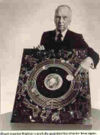Difference between revisions of "Pages 29-37"
(→Page 36) |
|||
| Line 7: | Line 7: | ||
==Page 31== | ==Page 31== | ||
| + | |||
| + | 31.17 '''Tripos'''<br /> | ||
| + | Formal exams at Cambridge University to demonstrate understanding and determine class honors. [http://en.wikipedia.org/wiki/Cambridge_Mathematical_Tripos Wikipedia] | ||
[[image:carroll-righter.jpg|thumb|100px|right]]31.28 '''Carroll Eventyr'''<br /> | [[image:carroll-righter.jpg|thumb|100px|right]]31.28 '''Carroll Eventyr'''<br /> | ||
Revision as of 14:12, 8 December 2009
This page-by-page annotation is organized by sections, as delineated by the seven squares (sprockets) which separate each section. The page numbers for this page-by-page annotation are for the original Viking edition (760 pages). Editions by other publishers vary in pagination — the newer Penguin editions are 776 pages; the Bantam edition is 886 pages.
Contributors: Please use a 760-page edition (either the original Viking edition with the orange cover or the Penguin USA edition with the blue cover and rocket diagram — there are plenty on Ebay for around $10) or search the Google edition for the correct page number. Readers: To calculate the Bantam edition use this formula: Bantam page # x 1.165. Before p.50 it's about a page earlier; as you get later in the book, add a page.
Finally, profound thanks to Prof. Don Larsson for providing the foundation for this page-by-page annotation.
Page 30
30.39 Jessica Swanlake
Jessica’s last name, like other musical references in the novel, is suggestive. Like the heroine of the Tchaikovsky ballet, she finds true love and is transformed, but then is abducted back to her former state by an evil magician (in this case, Pointsman).
Page 31
31.17 Tripos
Formal exams at Cambridge University to demonstrate understanding and determine class honors. Wikipedia
As Weisenburger notes, "eventyr" is Danish for "adventure" but in the sense of a tale or story ("The Adventures of . . . "). It can signify "folk tales" or "fairy tales," as in Hans Christian Andersen’s stories. The first name evokes Lewis Carroll but it also suggests the astrologer Carroll Righter, whose face appeared on the cover of Time magazine for a story about growing interest in the occult on March 21, 1969. Righter, nicknamed "The Gregarious Aquarius," later would read charts for Ronald Reagan, among other celebrities. Also see the note at 742.29.
Page 33
33.26 Witchcraft Act
Correspondent Igor Zabel offers this interesting elaboration on the reference:
"A few years ago, I came upon a short article in our daily newspaper Delo, which could be interesting here. It says: 'The British spiritualists started a campaign to acquit Helen Duncan, sentenced as a witch during the World War II. She was sentenced as a consequence of a séance in 1942. She told she had seen in her trance a dead soldier wearing a cap with the inscription HMS Barham, who had told her: My ship was sunken. The news about this fact (the ship was supposedly sunken on 25 November 1942) was kept secret by the British government for two years, as Winston Churchill wrote in his diary. In 1944, Duncan was arrested since they were afraid that she would reveal also the date of the D-day. Her trial was based on the Witchcraft Act from 1735, and she was sentenced to nine months of prison. Argument: Helen Duncan pretends that she conjures the spirits of the dead.' It seems that Mexico refers to this case; the year and quotation from the Act correspond to the conviction of Helen Duncan." A web search using Helen Duncan's name will reveal several websites devoted to the "medium martyr."
Page 36
36.3 ICI Standing for Imperial Chemical Industries. one of the foremost British public companies, known as the bellwether of the British economy before its reconfiguration and relative demise.
36.27-28 the Other Chap in this case being known as Beaver"Beaver" is the nickname for Jessica’s other and more staid lover, Jeremy. The nickname derives from the ‘40s slang for the beard he sports. (For example, in the "home front" film Since You Went Away [1944], the bearded character played by Monty Woolley is referred to as "Beaver.") The word also is vulgar slang for a woman’s pubic hair or genitals.
Page 37
37.10-11 Fred Roper’s Company of Wonder Midgets
| 1 Beyond the Zero |
3-7, 7-16, 17-19, 20-29, 29-37, 37-42, 42-47, 47-53, 53-60, 60-71, 71-72, 72-83, 83-92, 92-113, 114-120, 120-136, 136-144, 145-154, 154-167, 167-174, 174-177 |
|---|---|
| 2 Un Perm' au Casino Herman Goering |
181-189, 189-205, 205-226, 226-236, 236-244, 244-249, 249-269, 269-278 |
| 3 In the Zone |
279-295, 295-314, 314-329, 329-336, 336-359, 359-371, 371-383, 383-390, 390-392, 392-397, 397-433, 433-447, 448-456, 457-468, 468-472, 473-482, 482-488, 488-491, 492-505, 505-518, 518-525, 525-532, 532-536, 537-548, 549-557, 557-563, 563-566, 567-577, 577-580, 580-591, 591-610, 610-616 |
| 4 The Counterforce |
617-626, 626-640, 640-655, 656-663, 663-673, 674-700, 700-706, 706-717, 717-724, 724-733, 733-735, 735-760 |


